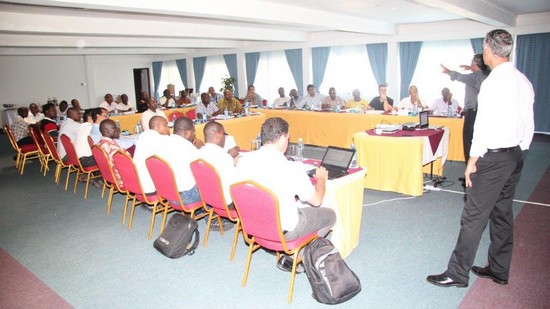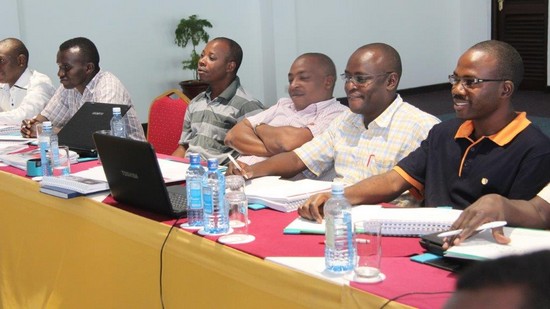World-class Training from Tuttnauer’s Top Experts
35 Professionals from 18 distributors gained high-level theoretical and practical knowledge focused on professional infection control, decontamination and sterilization methods during a week of intensive training mixed with some fun that will empower their professional growth.
A Memorable Learning Experience
We wanted students to leave the training with a taste for more. This is why we invested five months of careful planning: searching for the best possible location and carefully constructing a curriculum that will provide knowledge that is essential for developing as the best professionals in their region. We searched for a place that is accessible, secure and beautiful. The Sarova Whitesands Hotel, a magnificent five star hotel, located on one of the longest beaches on the Kenyan coast was perfect. It's an inspiring place for a vacation and a great resort for business meetings. We crafted the curriculum; we shipped over equipment, autoclaves and learning materials. We achieved our goal of the best possible conditions for learning and connecting.

Sunset at Sarova Hotel
One of Tuttnauer's mantras is that business is done between people. This week of training was a great opportunity for our team to build new friendships. It is important for the staff at Tuttnauer to get to know the people behind the business, we believe this improves communication and increases productivity. Another Tuttnauer motto is that although sterilization and sterilization equipment is complex, we strive for simplicity. Our challenge is to understand and explain the complex theory and practice of sterilization and make it easily understandable. Join us to find out how it's done.
From Theory to Practice
The training in Kenya was divided between the theory and practice of sterilization. The end goal was simple: How can we guarantee that everything that enters a Tuttnauer autoclave leaves the sterilizer at a high Sterile Assurance Level (SLA) at process end. Seems pretty simple, Right? The road to sterility requires some advanced knowledge and skill. The first part of the training was dedicated to sterilization theory. We answered questions such as: What is sterilization? How physical conditions such as humidity and temperature affect the sterilization process? We dealt with issues regarding condensation and much, much more. The professionals who took part also learned about the different autoclave classes: Class N, Class S and Class B, and for what conditions they are required, how to determine which class is suitable for various types of instruments and applications.
After understanding the theory, we progressed to learning about the different autoclave models available from Tuttnauer. The info provided was mechanical, we learnt about everything that happens behind the autoclave door: we explained the piping system and how the different parts of the autoclave work. We learnt about the horizontal autoclave, its structure and operation. The course also focused on the autoclave operating & control software, with emphasis on Bacsoft, Tuttnauer's latest control software which has introduced additional flexibility into Tuttnauer sterilizers and greatly improved easy-of-use for operators working the machines.
We answered many questions and helped the technicians solve problems they encounter in their workday. The theoretical training gave them a sound understanding of the best sterilization processes from start to end.

In Theory, Practice Is Simple
This intensive learning is worth little without real life application and practice. So, we rolled up our sleeves and got down to business. We had several Tuttnauer autoclaves at the training which were used for demonstration and hands-on practice. We ended the hands-on training with a visit to a Tuttnauer installation in a Kenyan hospital to see how it operates in a real-world environment.
Tuttnauer Goes Social
Learning with no fun? Not in Tuttnauer’s school. We enjoyed connecting with people, getting to know them, understanding their needs, challenges and how they use autoclaves, but we also got to know a little about who they are and about their cultural background. We find it just as fascinating as teaching, if not more. We've also learnt over the years that personal contact helps distributors and technicians feel more comfortable to address us with any issue that comes up, and helps strengthen the sense of partnership, which is so important for us. We encouraged participants to create social ties among themselves; we had coffee breaks and meals together and made sure we dedicated time to the fun social part of the training. This helps, when many of the course participants create unofficial support circles and tend to help each other if they encounter technical difficulties. This person-to-person, real-life network of support often evolves into a long-lasting network that is maintained through social media. Yay to technology which helps keep us connected!!!
All participants successfully graduated and received Tuttnauer autoclave technical certification at the closing ceremony. We had so much fun and enjoyed passing on our knowledge. We're using this opportunity to thank all course participants who dedicated an entire week to this important sterilization training course.
As Shakira sings, Waka Waka, eh eh, Tuttnauer hopes that this week of training and fun will help our African distributors continue to Waka Waka (in Cameron language: performing a task done on its best side). Tuttnauer will keep up training professionals all over the world. Hope to see you at Tuttnauer’s next training in your region.

